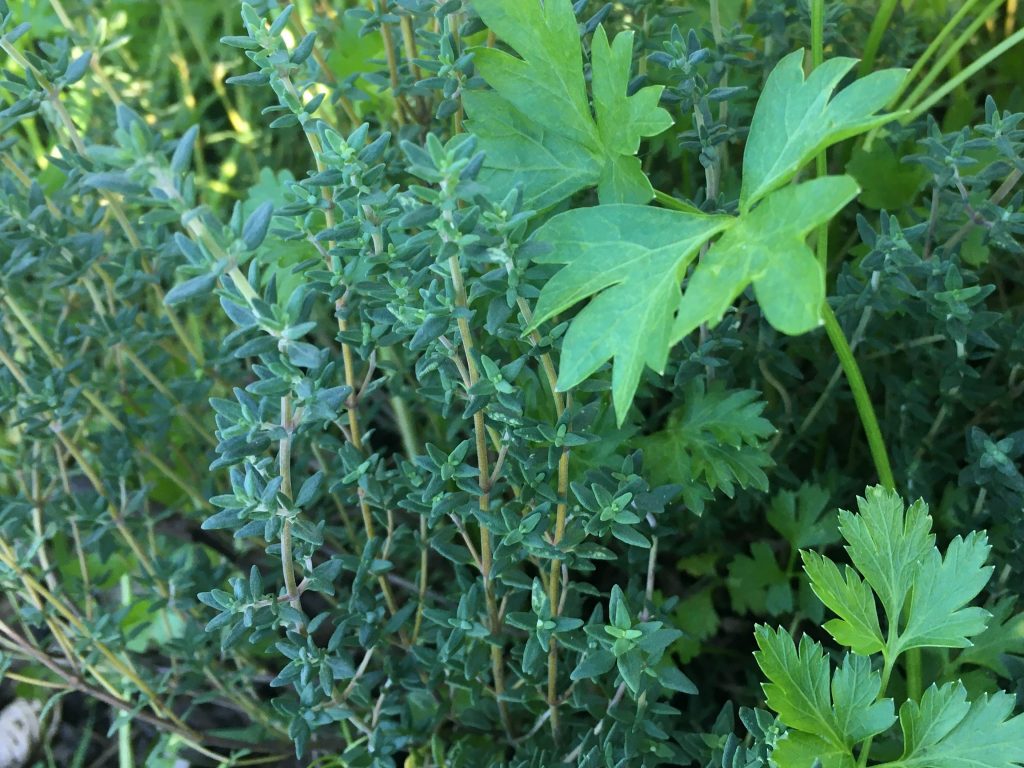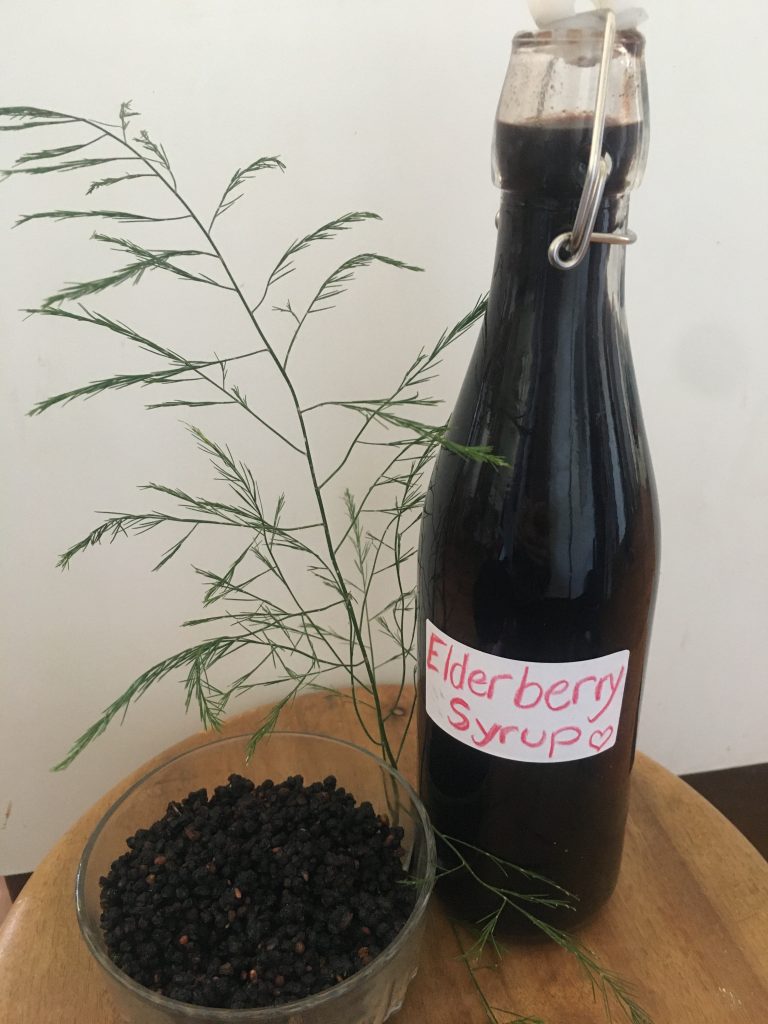by our naturopath and homeopath Odette Huxley

Thyme – antifungal and antibacterial
I don’t know if you love a warm herbal tea as much as I do but there is such a selection of plants you can make into teas. These flowers, fruits, leaves and roots are gifts from nature and work synergistically with our body for healing and enjoyment. There are so many herbs for many different conditions but for the purpose of this blog I will discuss primarily common teas for respiratory health – colds, flus, coughs, etc.
One of my daily routines is a warm lemon and ginger drink first thing in the morning. This is great for digestion, your liver, bowel, circulation, and lungs.
For colds and flu, you can add a pinch of cayenne pepper, and some raw honey. The pepper will warm you, help you sweat and assist in detoxification.
Here’s a list herbal teas and their medicinal purposes.
Oregano – I use oregano from my garden in teas and food. There are different types, and some are much stronger in flavour than others. The herb is antifungal and antibacterial so is suitable for colds, sore throat, cough, bronchitis.
Thyme (use leaf and flower) – One of my favourites. Antimicrobial, antibacterial, helps clear excess mucus from lungs, antispasmodic. For cold, coughs, tonsillitis, pharyngitis, gum health, bronchitis.
Mullein (leaf) – A great lung herb. It’s anti-catarrhal, soothing and helps move mucus out of lungs. For bronchitis, colds, respiratory catarrh, flu, sore throat.
Licorice (root) – YUM!! Not the traditional licorice sweet but the real deal! It is anti-inflammatory, soothing, decreases coughing, adrenal tonic. Used for coughs and colds, bronchitis, asthma (limit consumption of this tea if you suffer from high blood pressure).
Elderflower (flower) – anti-catarrhal, helps control fever by encouraging sweating. Use for fever, sinusitis, colds, viruses, flu, bronchitis, common cold, sore throat, ear infections.
Echinacea – (flowers and roots) – has many medicinal uses from immune balancing and building to lymph cleansing, blood purifying and anti-inflammatory. Used to prevent and treat infections, colds, flus, conjunctivitis, sinusitis, bronchitis, swollen glands, sore throat, tonsillitis, ear infections.
Ginger (root) – increases circulation, helps controls fever, anti-inflammatory, calming, digestive. Use for colds, acute infections, fever, bronchitis, asthma.
Fennel (fruit) – calming, helps move mucous, antispasmodic, antimicrobial, respiratory catarrh, bronchitis, colic, bronchial asthma.
Elderberry (berry) – with its strong antiviral benefits it’s no wonder it’s a favourite for influenza, respiratory infections and colds! It’s also anti-oxidant and immune building and great for children. (See below for a link to a recipe for elderberry syrup. So delicious, and wonderful to keep in the fridge for disease prevention and treatment).
This list of herbs is by no means a complete list of respiratory herb teas. Included though are some of the main herbs, and ones you may find in your own garden or can plant to make a mini-medicinal garden. It’s a wonderful feeling to connect with the medicine you are taking, especially by picking it straight from your garden!
When using dried herbs to make tea, use 1-2 teaspoons (more if your herbs have big fluffy leaves and flowers) and pour the boiling water over them and cover with a lid. Let them steep for 5 to 10 minutes (to get the full medicinal benefit 15 minutes is ideal), then strain and drink.
You will usually need a larger quantity of herb if using fresh herbs (maybe a tablespoon or more depending on the herb and how strong you like your tea).
If you are using the root part of the herb (ginger, licorice, echinacea root) you will need to steep for at least 15 minutes to get the full medicinal benefit.
Elderberry Syrup Recipe
(To prevent and treat colds and influenza)
Elderberry is an amazing herb. The berries are immune-enhancing, antiviral, and antioxidant.
Ingredients

Elderberry syrup – store in the fridge
3 ½ cups purified water
¾ cups dried elderberries (I use organic)
1-2 tablespoons fresh grated ginger (or 1-2 teaspoons ground ginger)
1-2 tsp of ground cinnamon (preferably true (Ceylon) cinnamon) or 1 cinnamon stick
¼ to ½ teaspoon ground cloves or half dozen whole cloves
1 cup raw honey (local/organic is best)
Put water in a saucepan. Add elderberries, ginger, cinnamon, and cloves.
Bring to a boil, cover, reduce temperature and simmer for 45-60 minutes or until the liquid has reduced by almost half.
Let cool until it can be safely handled. Strain through a mesh strainer and squash the berries with a spoon to get all the juice out or squeeze liquid through a muslin cloth or a nut milk bag. Dispose of berries in the compost.
When the liquid is at room temperature add the honey and stir through well. If honey is quite thick as raw honey can be you may just warm it ever-so slightly so that it combines.
Pour the syrup into a glass jar. It may store for one to two months in the fridge.
The dosage will vary depending on the age and weight of the child (for babies under one year old substitute the honey for another sweetener such as maple syrup, and only up ½ tsp per dose)
Dosages:
Children (1 year plus) – 1/2 to 2 teaspoons daily
Adults (12 years and over) – approximately 1 tablespoon daily
If you feel a cold or flu coming on or are unwell you may increase this dosage to 3 or 4 x daily.
If you are interested in purchasing organic dried elderberries they are now available at Central Coast Body Mechanics. Please contact myself – Odette Huxley 0429 104 865 or odettehuxley@hotmail.com
I hope you enjoy many of these teas as much as I do.
With blessings for good health always, Odette.
